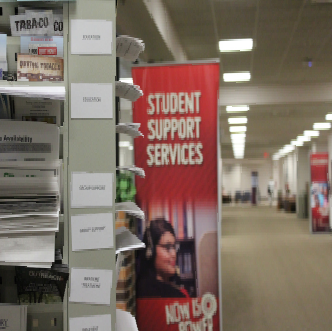Learning Support Office closes; students can still find help

Students needing help with academic success will continue to have options, even after OCCC has closed the Learning Support office.
The Learning Support office gave advice to students about studying strategies, and other tips to help them in their academic experiences, Lathonya Shivers, TRiO program director said.
The department was dissolved in April.
Now, OCCC is providing the support of “student success advisors” who will help with things like career planning and finding appropriate classes to enroll in, according to OCCC’s website.
These new student success advisors are assigned to a student throughout their time at OCCC, Shivers said.
These advisors help students working towards a degree in their division, professor of political science Dr. Shanna Padgham said.
Other programs across campus offer help for students with more specialized needs.
Student Support Services provides disability services and counseling services. Its office is located near SEM entry 3.
Disability Services provides accommodations to make course materials more accessible to students with disabilities. These accommodations include extra time on tests and permission to record lectures.
Coordinator of Disability Services Todd Rudat said his department still refers students to the various support programs available for students.
“If anything, the amount of supports our students can access has increased,” Rudat said.
Counseling Services, located at the Student Support Services office, helps students find ways to deal with anxiety, concentration issues, and other emotional and mental health issues, according to OCCC’s website.
Another program available for some college students is TRiO Student Support Services.
Due to the similar naming between OCCC’s Student Support Services and TRiO’s Student Support Services, OCCC calls the latter TRiO-SSS, Shivers said.
The TRiO programs are a series of government programs designed to help students from disadvantaged backgrounds with their college experience, according to the nonprofit organization, Council for Opportunity in Education.
OCCC participates in two of these programs, according to OCCC’s website.
The first, TRiO-SSS, helps students by connecting them with tutors who have taken the class in question, or who are proficient in the subject they need help with, Shivers said.
To be eligible for TRiO-SSS, a student must be a first-generation college student, meaning neither of their parents completed a four year degree; have a disability on file with OCCC; or be in a low income family, according to OCCC’s website.
The other TRiO program at OCCC is Upward Bound, a program designed to help high school students prepare for college.
Shivers said that although the TRiO programs are mostly known for their support available for first-generation college students, she’s worked with students whose parents both graduated with bachelor’s degrees.
“If you have two school teacher parents, and you have five children … you might qualify as low-income,” she said. “Teachers are not paid well.’’